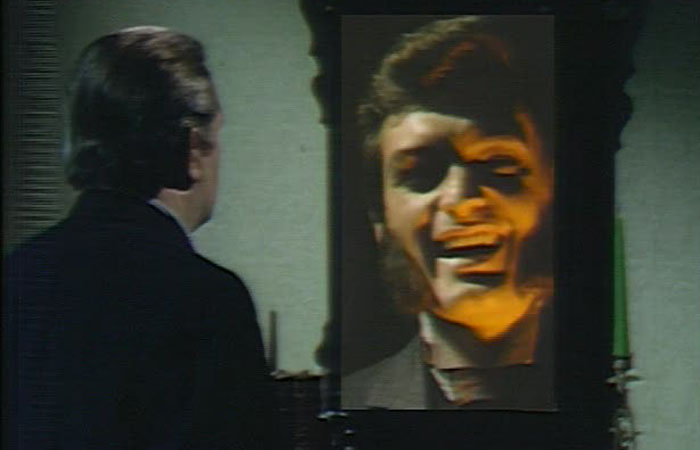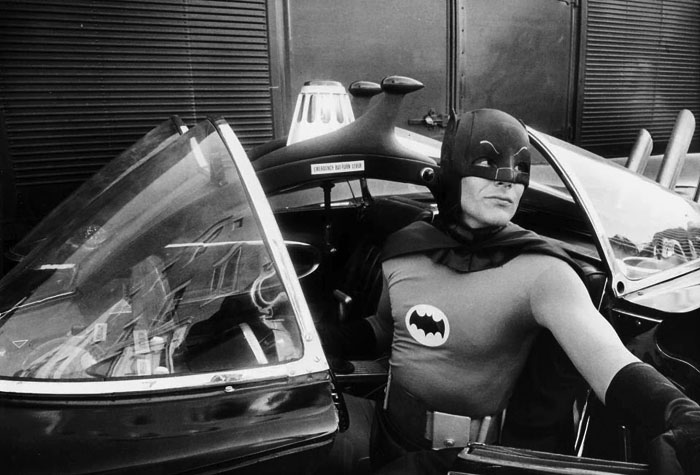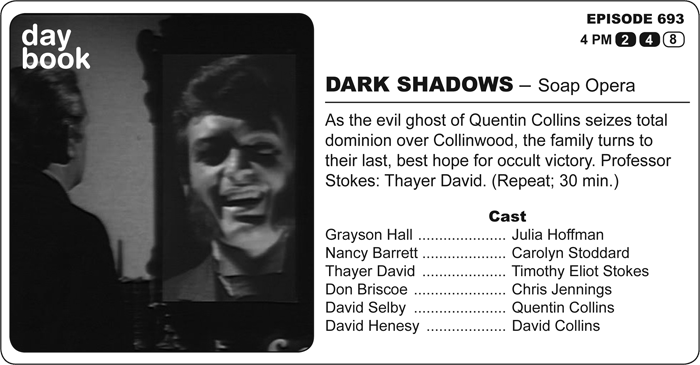
By PATRICK McCRAY
Taped on this date in 1969: Episode 693
When Julia recruits a seductive occultist to exorcise Collinwood, will the vengeful spirit of Quentin Collins meet his match? Timothy Stokes: Thayer David. (Repeat. 30 min.)
Chris wrestles with leaving until Julia tells him about the haunting of Collinwood and David’s possession. He is further shocked to learn that he may be a person of interest to the spirit. Meanwhile, Stokes manipulates David into confirming the haunting. He conducts an exorcism of the house as David screams for him not to and must be restrained. The professor seems triumphant. However, as Stokes maintains a vigil that night, Quentin appears in the mirror and taunts him with his failure.
Even though he’s not in every scene, and even though the “star” of the episode is Professor Stokes, the real lynchpin to 693 is Chris Jennings. Not so much for what he does, but for what he almost does, namely, get the hell out of Dodge. When Donald Brisco’s Jennings finds out that David is possessed, his stunned reaction is quietly authentic. In the jaded world of theatre insiders, werewolves are not known for their muted representation of dramatic truth, but Jennings is really struck by how deep this situation runs. He’s been a lycan for years. He’s responsible for Sabrina’s catatonia and hairstyle. Sees pentagrams on foreheads. It’s not a life devoid of the fantastic. And even he is thrown by this one.
This is one of the few episodes of the horror series to contain actual horror rather than the mere symbols of horror. Chris has consigned his young sister to live in a house with a boy whose relatives believe to be possessed. Moreover, so does their -- and his -- doctor. And the doctor further believes that he is somehow important to the possessing entity on a level she can’t pin down. Maybe it’s true. Or maybe they’ve got a wicker man on the other side of Widow’s Hill. Either way, there is no safe option among the people you once thought were the only safe option. A werewolf is a monster, and because monsters are special effects, they are rarely, legitimately scary. The horror factor in a werewolf movie has little to do with the werewolf. It’s with the amnesia of the human within. As much as you fear for the safety of those around you, you’re also grateful for them. They see what you can’t. They can restrain or even destroy you when the time comes. They are the last line of defense when you go mad. But what if they end up being mad themselves? Worse yet, what if they don’t, but just sound like it?
As abstract as Chris is, he is still us when we started watching the series. He’s an outsider to Collinsport. Unlike Chris, we’ve gotten used to the town. We’re hard to shock, as are the Collinses. It takes a real world surrogate to make us step back and appreciate just how jarring the situation is. Outside the house, Chris, a visitor, tries to leave. Within the house, another visitor -- Quentin -- is such an unwanted guest that the Collinses have to call in an exterminator: Stokes.
Never again will Stokes be given such an arc, largely because the defeat he suffers is humiliating on a level tantamount to his arrogance. Because of his charm, that’s an easy fact to lose in the sandpile of 1,225 episodes. Fortunately, he doesn’t take his crystal ball and go home. He advises. Time travels, himself. However, compared to the build-up he’s been given, Stokes never delivers like he tries to, here. Nor is he given the chance. Perhaps he doesn’t even give himself the chance. Where is he at the final climax of the Leviathan arc? I don’t recall. Where is he when Gerard reaches a fever pitch? Allegedly out of the country, but if I learned that he just put on a fake mustache and waited the whole thing out at the Blue Whale, I couldn’t blame him. Under other circumstances, looking in the mirror and seeing David Selby staring back would be a delight, but not cackling madly.
Stokes’ first and last major defeat has been coming since we met him, and Gordon Russell's dynamic and gritty script both roots and elevates the professor as both all-business and there to do nothing but take care of same. He smokes like a noir detective. He roars at David after snapping a symbolic pencil of him, making himself more viscerally threatening than Quentin has ever been. And thus, more of a match for the silent giant. Stokes lays traps but lays off the epigrams and witticisms. The bon vivant mask discarded at last, perhaps it was just a tool to bring him close enough to Collinwood to fight a danger he always knew was in residence. And then there’s the exorcism, which has an immediate sense of emotional violence that defines horror. It’s a perilously uncomfortable situation, and that’s the kind of authentic fear I referenced.
If it were merely Stokes conducting an uncharacteristically Abrahamic ceremony with his characteristic panache, the whole thing would be just TV. And if it were David writhing and screaming, I’d write it off as Desperate Bid for Attention #538. Putting them together is a deeply unpleasant alchemy, and it makes Quentin vaguely more sympathetic. As nasty as Quentin has been, there’s something unsettling-yet-necessary about seeing Stokes press David while deliberately withdrawing his warmth and sympathy to the point of humiliating him with a lie. By the time the exorcism happens, David’s raving response has an immediate panic to it that seems a little too real. Is David afraid that Quentin will retaliate or afraid that Quentin will once more leave him alone and defenseless amongst these increasingly angry adults? Either way, he seems like a victim of abuse from all sides and his helpless, hapless agony during the ceremony blends with Thayer David’s thunder to make this one of the show’s most disturbing installments.
Quentin’s returns, and by now, our responses are a carefully programmed ambiguity. I mean, of course he’s going to return. He’s the next threat and he has yet to say a word. And of course it was too easy. While I, like all red-blooded Americans, would be happy to watch an extended scene of Thayer David sitting in a chair (which was Warhol title, I think), I also know that Selby is cosmically obligated to get him out of it. Stokes, nervously smoking away, has a seedieness here. He’s a man all too happy to terrorize a kid. Quentin? Oddly triumphant in his reassurance to Stokes that his skills are meaningless. Could this be intentional on Russell’s part for the short-and-long term planning of the show? Stokes must be defeated for us to more fully understand Quentin’s powers… and to catalyze Barnabas’ trip into the past. But Quentin is our next hero. And by showing him taunting a character who was, at least in this episode, an occasionally self-important bully who made a child scream (if for the best reasons)? It’s hard not to start liking him, already.
Maybe that’s the real reason behind Quentin’s laughter. Sometimes he’s better than the people he haunts.
This episode was broadcast Feb. 19, 1969.



